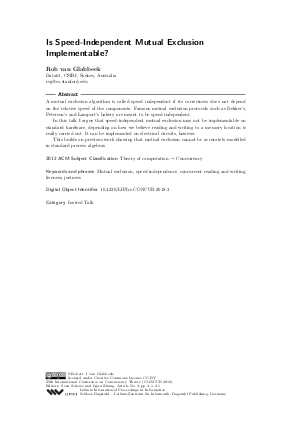Is Speed-Independent Mutual Exclusion Implementable? (Invited Talk)
Author Rob van Glabbeek
-
Part of:
Volume:
29th International Conference on Concurrency Theory (CONCUR 2018)
Part of: Series: Leibniz International Proceedings in Informatics (LIPIcs)
Part of: Conference: International Conference on Concurrency Theory (CONCUR) - License:
 Creative Commons Attribution 3.0 Unported license
Creative Commons Attribution 3.0 Unported license
- Publication Date: 2018-08-31
File

PDF
LIPIcs.CONCUR.2018.3.pdf
- Filesize: 156 kB
- 1 pages
Document Identifiers
Subject Classification
ACM Subject Classification
- Theory of computation → Concurrency
Keywords
- Mutual exclusion
- speed independence
- concurrent reading and writing
- liveness
- justness
Metrics
- Access Statistics
-
Total Accesses (updated on a weekly basis)
0PDF Downloads0Metadata Views
Abstract
A mutual exclusion algorithm is called speed independent if its correctness does not depend on the relative speed of the components. Famous mutual exclusion protocols such as Dekker's, Peterson's and Lamport's bakery are meant to be speed independent. In this talk I argue that speed-independent mutual exclusion may not be implementable on standard hardware, depending on how we believe reading and writing to a memory location is really carried out. It can be implemented on electrical circuits, however. This builds on previous work showing that mutual exclusion cannot be accurately modelled in standard process algebras.
Cite As Get BibTex
Rob van Glabbeek. Is Speed-Independent Mutual Exclusion Implementable? (Invited Talk). In 29th International Conference on Concurrency Theory (CONCUR 2018). Leibniz International Proceedings in Informatics (LIPIcs), Volume 118, p. 3:1, Schloss Dagstuhl – Leibniz-Zentrum für Informatik (2018)
https://doi.org/10.4230/LIPIcs.CONCUR.2018.3
BibTex
@InProceedings{vanglabbeek:LIPIcs.CONCUR.2018.3,
author = {van Glabbeek, Rob},
title = {{Is Speed-Independent Mutual Exclusion Implementable?}},
booktitle = {29th International Conference on Concurrency Theory (CONCUR 2018)},
pages = {3:1--3:1},
series = {Leibniz International Proceedings in Informatics (LIPIcs)},
ISBN = {978-3-95977-087-3},
ISSN = {1868-8969},
year = {2018},
volume = {118},
editor = {Schewe, Sven and Zhang, Lijun},
publisher = {Schloss Dagstuhl -- Leibniz-Zentrum f{\"u}r Informatik},
address = {Dagstuhl, Germany},
URL = {https://drops.dagstuhl.de/entities/document/10.4230/LIPIcs.CONCUR.2018.3},
URN = {urn:nbn:de:0030-drops-95415},
doi = {10.4230/LIPIcs.CONCUR.2018.3},
annote = {Keywords: Mutual exclusion, speed independence, concurrent reading and writing, liveness, justness}
}
